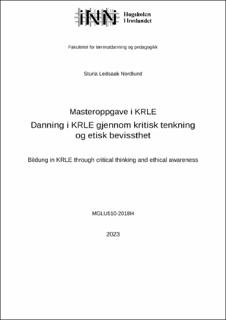| dc.contributor.advisor | | |
| dc.contributor.author | Nordlund, Sturla Ledsaak | |
| dc.date.accessioned | 2023-07-01T16:10:12Z | |
| dc.date.available | 2023-07-01T16:10:12Z | |
| dc.date.issued | 2023 | |
| dc.identifier | no.inn:inspera:136493732:37649449 | |
| dc.identifier.uri | https://hdl.handle.net/11250/3075107 | |
| dc.description.abstract | Danning står sentralt i dokumentene som regulerer virksomheten i den norske skolen. Overordnet del tydeliggjør at skolen har både et dannings- og utdanningsoppdrag. I lys av danningsoppdraget står kritisk tenkning og etisk bevissthet som to helt sentrale verdier, som også kommer til uttrykk i opplæringens verdigrunnlag. Dokumentanalysen i denne oppgaven viser at Opplæringsloven og overordnet del gir uttrykk for at kritisk tenkning og etisk bevissthet skal være en del av opplæringen, og at dette er verdier og holdninger som samtidig kommer sterkt til uttrykk i KRLE-læreplanen på måter som kan fremme danning.
Et sentralt punkt innenfor danningsprosessen er at elevene skal tilegne seg verdier fra samfunnet og kulturen, samtidig som de reflekterer og problematiserer over de samme verdiene. Analysen og drøftingen i dette prosjektet viser at KRLE-faget kan bidra inn i denne prosessen ved å vekte kritisk tenkning og etisk bevissthet som verdier elevene skal internalisere, samtidig som verdiene også kan brukes som arbeidsmåter og verktøy i faget for å skape refleksjon som utvikler i holdninger. Dette forutsetter at KRLE-læreren bruker det didaktiske handlingsrommet og læreplanene inn i undervisningen på måter som gjør at kritisk tenkning og etisk bevissthet blir dannende innhold i faget.
Oppgaven viser samlet sett at KRLE-faget har svært gode muligheter og forutsetninger for å bidra til løsningen av skolens danningsoppdrag. | |
| dc.description.abstract | English title: Bildung in KRLE through critical thinking and ethical awareness
Bildung (formation) is central to the documents that regulate activities in the Norwegian school. The core curriculum states that the school has both an formational and a educational mission. In light of the formational mission, critical thinking and ethical awareness are two central values, which are also expressed under the educational values in the core curriculum. The document analysis in this thesis shows that the Educational Act and core curriculum express that critical thinking and ethical awareness must be part of formation, and that these are values and stances that are also strongly expressed in the curriculum for Knowledge of Christianity, Religion, Philosophies of life and Ethics (KRLE), in ways that can contribute in formation.
A central point in the formation process is that the pupils must acquire values from society and culture, while at the same time reflecting on and problematising the same values. The analysis and discussion in this thesis shows that the KRLE-subject can contribute to this process by emphasizing critical thinking and athical awareness as values that the students must internalize, at the same time that the values also constitute working methods and tools in the subject to create reflection that results in stances. This requires that the KRLE-teacher uses the the didactic room for action and the curricula in teaching, in ways that make critical thinking and ethical awareness a formational part of the subject.
Overall, this thesis shows that the KRLE-subject has very good opportunities and prerequisites for contributing to the solution of the school’s formational mission. | |
| dc.language | nob | |
| dc.publisher | Inland Norway University | |
| dc.title | Danning i KRLE gjennom kritisk tenkning og etisk bevissthet | |
| dc.type | Master thesis | |
